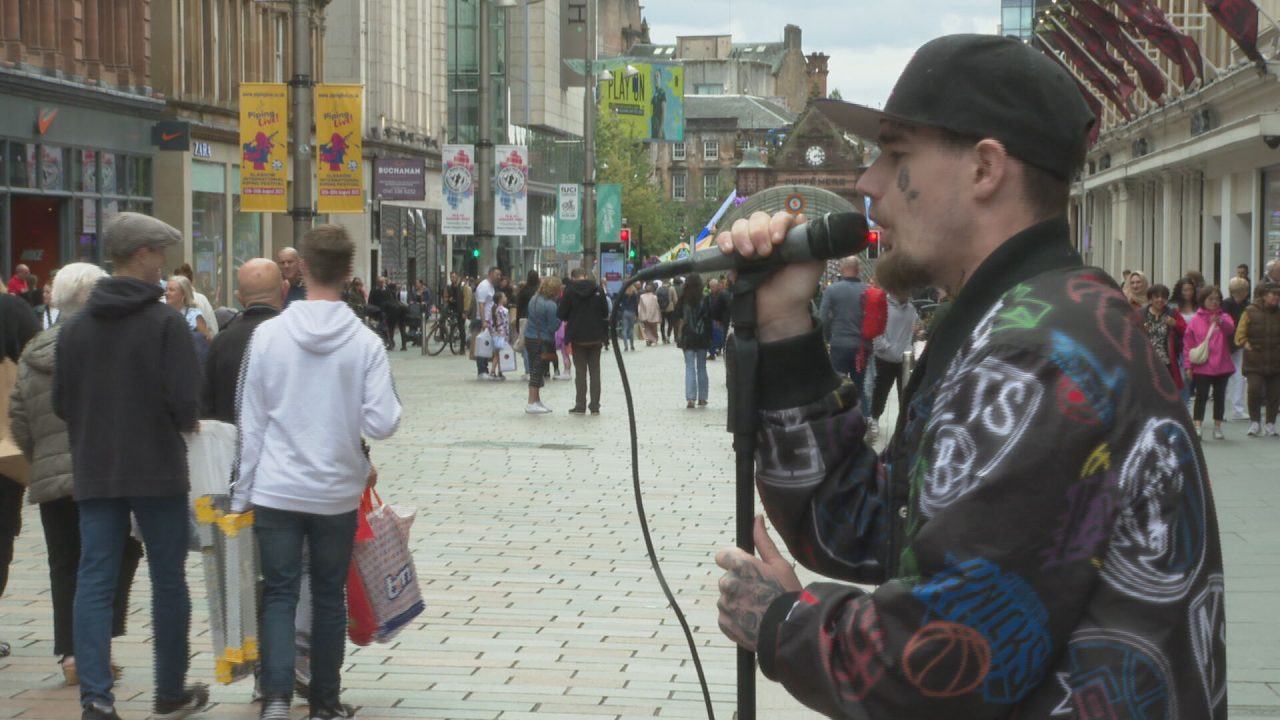New signs encouraging good behaviour from Glasgow’s street performers are set to be installed, after a consultation found the majority believe buskers “liven up the city” despite concern from businesses.
Council officials and Police Scotland will also carry out days of action over the summer to resolve issues through engagement — although “persistent offenders” could face fines or have their equipment confiscated.
Glasgow City Council launched a survey on busking as it “regularly receives complaints from the public about ‘nuisance’ street performing”.
It received “one of the biggest ever public consultation responses” as over 2,700 people replied with one in 20 saying they had a business in the city.
Street performing is not licensed but the council has a voluntary code of conduct for buskers and performers.
Only Police Scotland has legal powers to move on a performer or confiscate their equipment if they are “deemed to be causing a noise nuisance”.
Council officials have reported the vast majority of respondents believe busking is worthwhile, but over half felt “noise levels are an issue”.
Poor performance quality, repetition and overstaying at pitches were also raised. Most believed the code of conduct should be more prominently displayed.
New signs should appear on Buchanan Street from mid-June while there will be a formal launch event to raise awareness. A council webpage has also been set up, which includes how to raise complaints.
Days of action with Police Scotland will “target compliance through engagement rather than enforcement, nevertheless, recurring complaints and persistent offenders may result in buskers facing stronger measures”.
This could include fines, confiscation of equipment or “potential referral to the Procurator Fiscal’s office”.
Four out of five respondents (81%) agreed or tended to agree that buskers liven up the city, however two out of every five (40%) said they had been “disturbed or inconvenienced by buskers playing the same series of songs or playing badly” or at an excessive level.
Almost a quarter of respondents had been disturbed or inconvenienced by buskers staying at the same pitch for over an hour.
Most Glasgow business owners (60%) who responded said they had been disturbed by buskers playing at an excessive level while nearly half said buskers had stayed at the same pitch for more than an hour.
Of those who were disturbed, 909 left a comment and 56% said buskers had been “too loud”.
A quarter complained about the use of amplifiers and 16% said performers had “a negative impact on their business or place of work”.
One in 20 comments claimed that religious preachers were inappropriate.
However, 87% of respondents said they had never complained.
Almost a quarter of the business owners had complained to a busker and a third said they had complained to either a performer, the police or the council.
Very few respondents felt their complaints had been resolved, with 75% saying they hadn’t been. One in ten of those who had made a complaint (11%) said that they were verbally abused by the busker, with one saying that they were physically abused.
Cllr Angus Millar, the council’s convener for city centre recovery, said: “Buskers and street performers are for many people a welcome feature of the city centre experience — and to make this experience as positive as possible, we asked for views on how this activity can best take place.
“The scale of the consultation responses received underlined support for these performers, but also indicated some issues which can impact on the quality of a visit to the city centre, as well as the experience of local residents, businesses and workers.
“In response to this, the council and its partners have identified a series of actions to help promote the buskers’ code of conduct, and respond to instances where some do not respect the code.”
The council previously had a city centre response team which liaised with buskers, businesses and residents to mediate issues, but it no longer exists.
Following the pandemic, issues related to “nuisance busking” have become “increasingly more prevalent”, officials reported.
Glasgow officials have also talked to their counterparts in Edinburgh, who have been exploring potential enforcement powers available to councils.
However, they reported that in January the Scottish Government position was “whilst amplification of sound is a source of considerable concern in some areas, it is not of a scale that requires action at the national level”.
Officials stated unless councils have “real enforcement powers their role can only be advisory, their greatest sanction being reporting to Police Scotland”.
Follow STV News on WhatsApp
Scan the QR code on your mobile device for all the latest news from around the country


 STV News
STV News

























